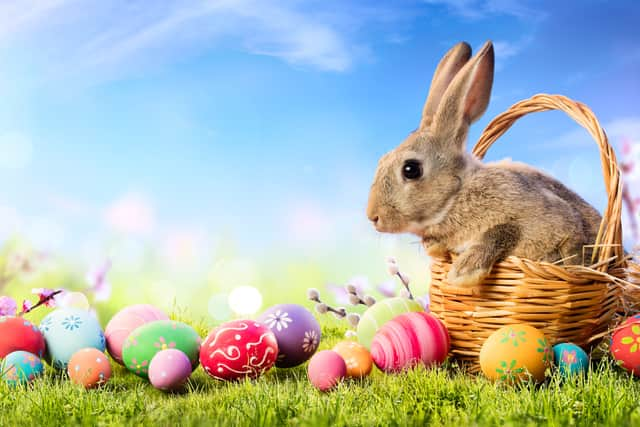Where does Easter bunny come from? Why we eat chocolate eggs at Easter - and origins of rabbit explained
and live on Freeview channel 276
Easter is a religious holiday, but like Christmas, it has come to be associated with things that don’t seem to have much to do with Christian beliefs.
One of the main elements of the Easter holidays that children in particular look forward to are chocolate eggs delivered by the Easter bunny. But where does the character come from? Here’s what you need to know about the origins of the Easter bunny.
Advertisement
Hide AdAdvertisement
Hide AdWhere does the Easter bunny come from?
Like customs associated with other annual events such as April Fools’ Day, the precise origins of the Easter bunny are unknown. There are multiple theories about where the Easter bunny came from.
One is that the rabbit comes from the ancient pagan festival of Eostre, which some believe is where the celebration of Easter began as it came before the advent of Christianity itself. Eostre is the Germanic goddess of dawn who is celebrated during the spring equinox. She is also the goddess of fertility and spring, and her animal symbol is believed to have been a rabbit which is the traditional symbol of fertility.
In America, some people believe the Easter bunny was first introduced in the 1700s by German immigrants in Pennsylvania.
It is said that they introduced their tradition of the egg-laying hare who was known as ‘Osterhase’ or ‘Oschter Haws,’ to the community. The hare would lay colourful eggs as gifts to children who behaved well, and in preparation for its visit children would then make nests for it to leave those eggs in. Over time, this tradition spread across America and became a widespread Easter tradition, and in time the gifts then came to include treats such as toys and chocolate.
Advertisement
Hide AdAdvertisement
Hide AdIn Germany, the tradition of the Easter bunny is believed to have originated among German Protestants around the 1600s.
Their Easter hare would also judge children and decide whether they deserved an Easter egg hunt or not.


Where did the tradition of Easter eggs come from?
The original tradition of eggs at Easter has roots in Paganism and is linked to Easter being a religious celebration.
For Christians, the egg symbolises the moment that Jesus emerged from the tomb following crucifixion and subsequent resurrection. For that reason, eggs symbolise new life for Christians and this is why they appeared in pagan festivals celebrating spring.
Advertisement
Hide AdAdvertisement
Hide AdWhy do we have chocolate at Easter?
Over time, the coloured eggs left by the Easter bunny can be replaced by chocolate eggs. At the same time, the nests children made to keep them in became the baskets we are familiar with. The first chocolate eggs are said to have been created in France and Germany in the 19th Century - but they were not like the sweet treats we know today, instead they were bitter and hard.
Chocolate-making techniques have improved over time too, and so have the ingredients available, and so the hollow eggs we are used to eating have been developed. Chocolate Easter eggs became popular across the world very quickly once that sweet, delicious recipe was created. Today, buying, giving and eating them is a favourite Easter custom among people of all ages.
When does the Easter bunny typically deliver chocolate eggs?
Again, there isn’t a definitive answer about when the Easter bunny delivers chocolate eggs.
The bunny always arrives during the Easter weekend, most typically on Easter Sunday morning.
Advertisement
Hide AdAdvertisement
Hide AdIn some households, the Easter bunny arrives on the evening of Easter Saturday and, similarly to Santa, leaves gifts for when children wake up on Easter Sunday.
When is Easter 2023?
This year, the Easter weekend begins on Good Friday, which is on 7 April. Easter Saturday is on 8 April, followed by Easter Sunday on 9 April. The Easter weekend finishes on Monday 10 April with Easter Monday. Good Friday and Easter Monday are bank holidays in the UK.
Why does the date of Easter change each year?
Unlike April Fools’ Day, Halloween, Bonfire Night, Christmas and New Year, the date of Easter is not set and changes every year. It can take place any time between 22 March and 22 April.
The date of Easter Sunday is decided based on a complicated set of calculations regarding observations of the moon.
The exact date on which Easter should be celebrated is something churches have debated for centuries, with various methods of calculation used by different sects.
Comment Guidelines
National World encourages reader discussion on our stories. User feedback, insights and back-and-forth exchanges add a rich layer of context to reporting. Please review our Community Guidelines before commenting.
